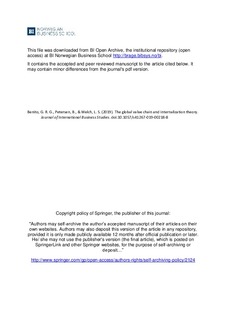The global value chain and internalization theory
Journal article, Peer reviewed
Accepted version
Date
2019Metadata
Show full item recordCollections
- Publikasjoner fra CRIStin - BI [1015]
- Scientific articles [2173]
Original version
doi.org/10.1057/s41267-019-00218-8Abstract
In a research note in this issue, Strange and Humphrey discuss how a global value chain (GVC) approach serves to usefully move internalization theory towards a better understanding of the increasingly important ‘middle ground’ between markets and hierarchies in the contemporary highly globalized international business scene. After a brief recount of their main arguments, we argue that their discussion needs to the extended, as it does not adequately recognize important differences between internalization theory and the GVC approach. Specifically, the approaches differ on the notions of efficiency, opportunism, and level of analysis. We then argue that internalization theory can benefit from the systemic view implied in the GVC approach, and discuss the role of trust as a coordinating mechanism in international business. This leads to a more general discussion of internalization theory and the difficulty of encompassing dynamic considerations such as learning and foreign operation mode combinations and flexibility within value chain interdependencies. We conclude with a research agenda that flows from our discussion.
